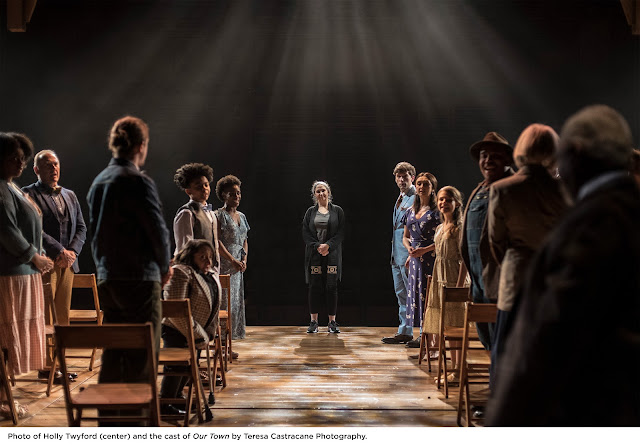Our Town, Shakespeare Theatre Company
Making theatre in a pandemic is a funny thing. Positive cases have become unavoidable within ensembles of all sizes, and artists are having to find all manner of ways to keep going. A robust cast of understudies and standbys has become a vital component, and more and more we see those understudies rotating in night after night. Friday, May 20th wasn't intended to be the opening night of Thornton Wilder's Our Town at the Shakespeare Theatre Company, but as director Alan Paul bemusedly explained, that's how things are going right now. The notice board in the lobby of Sidney Harmon Hall showed that six understudies would be going on, including very recognizable faces to local audiences with Todd Scofield and Elliot Dash as the play's two patriarchs and Erin Weaver as Professor Willard, alongside Kiana Johnson, Ryan Neely, and Quinn M. Johnson. Paul explained in a previous year, this would be an unmitigated disaster; on Friday night, it felt like a triumph.
One of the most discussed elements of this production has been those familiar faces in the cast, as Paul cast the entire company out of DC-based actors, celebrating the community of artists who make our own town their home. It's a perfect pairing of story and casting, in many ways--Our Town isn't a play that wants big names and star turns; it wants to depict universal experiences of life, death, and communities in ways that are instantly recognizable and feel like home. Seeing Holly Twyford enter as the Stage Manager, ready to lead the audience through the evening's story, was its own emotional experience, and one that certainly felt like a homecoming to me. The deep bench of DC talent is one I've long wished more theatres (STC included) would make better use of, and this production serves as a showcase for exactly the faces we've been longing to see again. Plus, it means that your cast is filled with knockout talents in smaller roles; Sarah Marshall's Mrs. Soames was exquisitely tuned and beautifully performed, and in a role that doesn't always get the attention it merits.
It's worth noting, however, that there are certainly unavoidable tensions in staging Wilder's play, a beloved chestnut and staple of American theatre though it may be. Specificity leads to universality, but it can be difficult to have the Stage Manager and other characters constantly present things as universal which simply aren't. For one example, the second act repeatedly tells us that men and women are supposed to go "two by two," marry and be together. On one iteration of this, the man and woman seated beside me both snickered softly, and one let out a very quiet "nope!" in response. The first act of Our Town is presented anthropologically, a single day preserved for the far-flung future to tell us how these specific people of rural New Hampshire lived in the early 1900s; the second act turns to say, actually, what we show here is universal. There's a tension in having a racially diverse cast tell the story of a very white Christian community in New Hampshire which the text called universal, and leaving that uncommented upon within the production. We're used to race conscious casting in Shakespeare, and making room within the text to comment on it (I can quickly point to STC's recent Merchant of Venice and Shirine Babb's Nerissa), but there doesn't seem to be the same effort made here. Instead, we are left with a tension that feels underexplored between the story presented, and the world we ourselves live in and the lives of the people telling it.

Comments